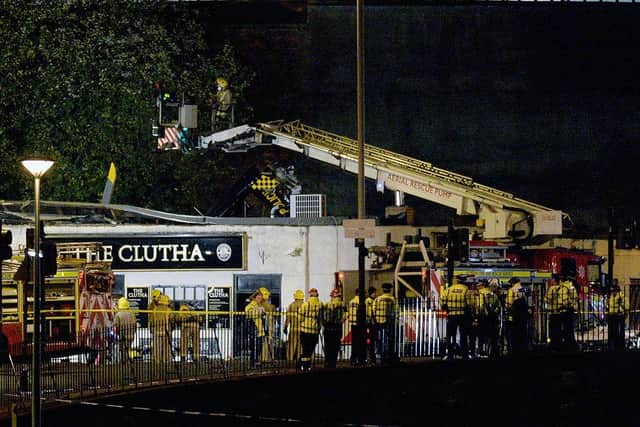Clutha tragedy anniversary: Survivors recall Glasgow helicopter crash on tenth anniversary of tragedy
It was an ordinary Friday night in the run-up to Christmas in Scotland’s biggest city, but in the blink of an eye, an evening of celebration turned to disaster. Now, a decade on from the devastating Clutha helicopter crash, some of the survivors have recalled the chaotic scenes as they struggled to escape, as well as the compassion they were shown in the aftermath of the tragedy.
At exactly 10.22pm on November 29, 2013, a Police Scotland helicopter crashed into the roof of the Clutha Bar, a popular pub by the River Clyde. It claimed the lives of the helicopter’s pilot, Captain David Traill, 51, and his two crew members, PC Tony Collins, 43, and PC Kirsty Nelis, 36. Seven customers in the pub also died – Gary Arthur, 48; Joe Cusker, 59; Colin Gibson, 33; Robert Jenkins, 61; John McGarrigle, 58; Samuel McGhee, 56; and 44 year-old Mark O'Prey.
Advertisement
Hide AdAdvertisement
Hide AdA further 31 people were injured in the incident, which sent shockwaves around Scotland and the wider world. Today, many of them will mark the anniversary in their own way. Some will return to the scene of the crash to leave floral tributes to those lost, while others will pay their own tributes.
Several of the survivors have provided emotional testimonies as part of a new BBC Alba documentary that airs this evening. It not only recounts the devastating stories of personal loss, but the care and togetherness that was shown to the pub’s regulars and staff in the wake of the crash.
The stories include those of sisters Ann Feeney and Nancy Primrose. They were among more than 100 people inside the Clutha watching the ska band, Esperanza, when the helicopter crashed through the venue’s roof.
“People say when things happen it is like a dream, and it was like a dream,” Ms Feeney recalled. “The pub went from being very, very noisy, very loud, to just being deathly silent. My initial thought was ‘this is a bomb’. I thought a bomb had gone off.”
Ms Primrose made it out of the pub first and, despite suffering head injuries, tried to return to the scene to find Ann, who later managed to escape herself. “Apparently I got up and I was running towards the Clutha, and I’m trying to get in, screaming for my sister, because I thought she was dead,” Ms Primrose said. “I don’t have any memory of that, I don’t have any memory at all.”


Mary Kavanagh, a Clutha regular, described the crash as a moment when “everything went dark”, with dust thrown up in the air leaving people coughing and unsighted. Only moments previously, her partner, Robert Jenkins, had gone to the bar to order drinks. “That was the last time I saw him,” Ms Kavanagh said.
The documentary, entitled ‘Clutha’, also features Anne-Marie Kennedy, who was working behind the bar at the Clutha at the time. In the moments after the helicopter made impact, she said she was left “trapped” and “in darkness”, and felt as if one of her legs was “dangling through the cellar”. It was only after firefighters dug her out of rubble and she was rushed to the Glasgow Royal Infirmary that she learned her limb had been snapped.
Outside the pub, meanwhile, Andrew Bergin was among those who witnessed the helicopter fall from the sky. He was walking by the River Clyde when he saw its rotor blades stop spinning, sending the machine’s tail dipping and spinning downwards. At first, he thought it had crashed in the river, but it was only when he saw a man covered head to toe in dust staggering towards him that he realised the aircraft had landed in the city centre.
Advertisement
Hide AdAdvertisement
Hide Ad“The guy looked like someone you see on the news when there’s been a bomb somewhere,” Mr Bergin said. “It began to dawn on me what had happened. The blue lights were reflecting off the rotor blade that was stuck in the roof of the pub.”
Hundreds of police, ambulance and fire service personnel responded to the crash, but those who emerged from the wreckage of Clutha, as well as members of the public outside, also helped with the disaster response. They included Ed Waltham, a retired firefighter, who was en-route to the Clutha at the time to meet up with his friend Doug Naysmith.
“I opened the doors and there was a wall of debris going from right to left,” Mr Waltham said. “I didn’t quite understand that at the time, but I thought the inside of the pub had collapsed, and whoever was in there was in big trouble.”
Ms Feeney was among those to express gratitude to the well wishers who rallied around those impacted by the crash in the days, weeks and months that followed. “We felt really cared for, we felt an immense sense of kindness from the people of Glasgow,” she told the documentary. “I’ve never wanted to be a victim of the Clutha. The victims were the ten people who died. I’m a very, very lucky woman.”
Four years ago this month, a fatal accident inquiry into the crash concluded Captain Traill “took a chance” and ignored low fuel warnings. Summarising his findings, Sheriff Principal Craig Turnbull said the “conscious decision” had led to fatal consequences. However, that verdict has been contested by several families and survivors, some of whom continue to campaign for answers around the tragedy.
Clutha will be shown on BBC ALBA at 9pm on Wednesday, November 29. It will also be available to watch on BBC iPlayer for 30 days afterwards.
Comments
Want to join the conversation? Please or to comment on this article.